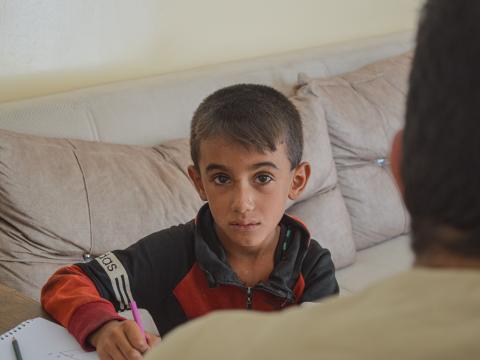Unlock mind, free from stigma

Anxiety and fear, though primal emotions ingrained in humans since the beginning of time, still have a profound impact, directly affecting both mental health and bodily functions.
5% of children above the age of 10 grapple with bedwetting, with one of the main factors being physiological stress. Unfortunately, this condition is frequently overlooked, despite its significant toll on the mental well-being of those affected, acting as a cycle of stress for children; stress triggers bedwetting thus intensifying stress and fostering feelings of shame.
In war-torn Syria, where countless children endure ceaseless fear from ongoing bombardments, this condition becomes more likely. Adding salt to injury, the lack of the most basic health care results in many children feeling hopeless about finding cure for their condition.
But The change is here
Tamara*, a worried mother walks through our medical centre's doors in Northcentral Syria and says: "My son, 10, suffers from bedwetting day and night, and I’m afraid that he is sick. This has become a source of worry for me and the family”. Could we find helping hands after all that we have encountered through the years? She asks herself. But what made her feel this way?
Forced to flee their once peaceful countryside, due to the emergence of war in Syria and armed forces control of their area, Adam*'s mother gave birth to the boy in the shadow of war and displacement. His family, once living in prosperity, faced countless struggles, losing everything they ever knew, relying on aid to survive.
“In 2014 we fled, clinging to hope for safety in a camp, only to see it fall under the grip of an armed group. Once more, we sought refuge in another camp, only to experience brutal bombing. With every escape, it seemed as though our world was collapsing into deeper despair," shares Tamara.
The family was running from a tragedy just to be faced with multiple others. They finally settled in Northcentral Syria but still problems continued to mount on this family of 11 members. “One of my greatest concerns was Adam’s condition, it began four years ago due to bombardment and with each clash and bomb near our home, Adam’s fear and condition intensified, breaking my heart even more,” says Tamara.
Although humanitarian aid can never erase the heart-wrenching cries and mournful sobs Syrians experience, for Adam and countless others, it offers a chance, a way to move forward and ease their daily struggles.
Thankfully, the eager mother found light at the end of a dark tunnel. Tamara and her son were warmly welcomed by the medical staff at the centre. After conducting several tests, it was determined that Adam didn’t suffer from any underlying medical condition. Instead, he was riddled with fear and anxiety due to years of witnessing war and bombs, directly influencing his well-being.

Still, even after reassuring his mother that he will get proper treatment and alleviating her concerns, her anxiety was still obvious. She shares,” I fear that the condition continues, I know a relative who is 19 and still suffers from this condition.”
The social stigma around this condition didn’t make it easy either, “People around us shame and call those who have this condition bad nicknames, I don’t want my son to face the same faith”.
As the recovery journey started, the focus was set on empowering Adam and providing him with methods to break through his fears. A simple drawing notebook became his magical tool, allowing him to pour out and express his emotions on paper and with educational psychosocial sessions, he was able to better manage his thoughts and fears.
Progressively, strategies were woven into his routine through a tailored recovery plan, beginning with a thorough biological plan which included the avoidance of diuretics, a medicine to reduce fluid buildup in the body, and the implementation of nighttime bedwetting alarm to help control bedwetting. After subsequent check-ins showed improvements through these methods, the "cloud and rain" strategy was introduced to Tamara. Throughout the process, our partner ensured that daily communication and positive reinforcement were used with Adam and Tamara to understand and address Adam’s fears, giving extra care on building his strengths.
The recovery plan was concluded with a final session that focused on teaching essential bladder control strategy, assisting him in a long-term recovery.
With the efforts done by the dedicated psychological support team, Adam for 10 consequent days was free of the chains of his condition and slept soundly.
The project didn’t only take care of his health and enabled him to return to his normal life but also eased his mind and his families and enabled him to become mentally resilient. Tamara also adds, “The care Adam received was nothing short of life-altering. Moreover, the enlightening sessions transformed how I connect with my children, further deepening my wisdom on nurturing and guiding them, it truly enriched my journey as a parent”.

Through the unwavering dedication and collaborative efforts of World Vision Syria Response’s team and our partners The Syrian American Society, “SAMS” we were able to mark a difference in Adam and 300 others with the physiological support services. Over 75,000 lives, spanning children, men, and women in Northcentral Syria, have been provided with multiple services such as, safe water access, improved waste management, enhanced health and nutrition services, and safe spaces.
Aiming to bring hope and healing to those facing difficult circumstances every day.
*Names are changed to protect identities